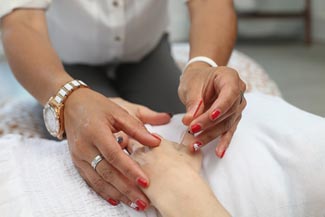If you suffer from peripheral neuropathy, you know the resulting numbness and pain can be literally unbearable. Walking, particularly on cold, hard surfaces – such as a tiled floor – can feel like stepping on ground-up glass.
The good news is that acupuncture can offer significant relief if you are experiencing neuropathy. Here is a comprehensive guide on acupuncture’s benefits for neuropathy.
What Does Research Say About Acupuncture for Neuropathy
While research is still being performed to test the effectiveness of acupuncture on peripheral neuropathy, there have been some successful studies.
In 2007, a pilot study involving one hundred and ninety-two consecutive patients with peripheral neuropathy confirmed that acupuncture as an alternative treatment method improved symptoms with fewer side effects for more neuropathic patients as compared to those receiving conventional medical care.
Another study investigated the effects of acupuncture on diabetic peripheral neuropathy. The study compared 42 patients who were treated with acupuncture with 21 cases provided with sham acupuncture and observed the effects on nerve conduction velocity and various subjective symptoms associated with diabetic peripheral neuropathy. Three out of six measures associated with motor nerves, along with two measures of sensory function, indicated noticeable improvement over the 15-day treatment period in the acupuncture group. However, no sensory or motor function noticeably improved in the sham acupuncture group.
In addition, a group of researchers from China evaluated the clinical efficacy of acupuncture through analysis and review of systematic reviews of acupuncture for the treatment of diabetic peripheral neuropathy. They concluded that acupuncture appears to have an effect on diabetic peripheral neuropathy, improving nerve conduction and clinical symptoms.
Another pilot study conducted with cooperation between Beijing University of Chinese Medicine (BUCM), China, and Tehran University of Medical Science (TUMS), Iran, aimed to evaluate the safety and effectiveness of acupuncture in the treatment of chemotherapy-induced peripheral neuropathy. Forty participants with chemotherapy-induced peripheral neuropathy were randomly and equally divided to receive 12 sessions of acupuncture (20 minutes per session over 4 weeks) or 3 take 300mg capsules of gabapentin and 1 300mg tablet of vitamin B1 each day for 4 weeks. After this, both groups were followed up for 4 weeks.
The study revealed that acupuncture, as a type of traditional Chinese medicine, is quite safe and effective in treating chemotherapy-induced peripheral neuropathy. In addition, acupuncture is more effective as compared to using gabapentin and vitamin B1 as the conventional treatment.
Lastly, a study conducted by the China Academy of Chinese Medical Sciences, Beijing, concluded that acupuncture could be regarded as a possible alternative therapy in treating paclitaxel-induced peripheral neuropathy – an intractable and common side effect of the conventional chemotherapy agent – paclitaxel.
What Is Neuropathy?
Peripheral neuropathy can impact various nerves, such as the sensory nerves that register sensations (such as cold, hot, soft, and pain) to motor nerves that govern movement. It can also impact autonomic nerves that control your digestion, body temperature, and heart rate.
Peripheral neuropathy can result from infections, traumatic injuries, auto-immune diseases, vitamin over-supplementation or deficiencies, exposure to toxins (including chemotherapy drugs), and metabolic problems. However, the most common cause is diabetes.
Symptoms of Neuropathy
The symptoms of neuropathy depend on which nerves have been impacted.
If motor nerves have been affected, the symptoms will include:
- Muscle weakness
- Twitching
- Foot drop
- Paralysis
- Muscle wasting
- Muscle cramps
If sensory nerves have been affected, the symptoms will include:
- Numbness
- Increased pain from things that should not trigger pain
- Decreased sensation of hot and cold or pain
- Loss of coordination or balance
- Sharp or burning pain
- Tingling and prickling sensation
If autonomic nerves have been affected, the symptoms will include:
- Diarrhea or constipation
- Belching, bloating, or feeling of sickness
- Increased heart rate
- Dizziness or fainting upon standing due to low blood pressure
- Sweating too little or too much
Symptoms can lead to challenges in everyday activities, such as trouble sleeping or walking due to pain in the legs and feet.
Causes of Neuropathy
There are several factors that can lead to peripheral neuropathy. Thus, it’s usually difficult to pinpoint the actual cause. Neuropathy can be caused by one of three methods:
- Acquired neuropathies are caused by environmental factors, including trauma, toxins, infection, or illness. Known causes of acquired neuropathy include:
- Alcoholism
- Diabetes
- Vitamin deficiency or poor nutrition
- Certain types of cancer and chemotherapy used to treat them
- Some medications
- Thyroid or kidney disease
- Pressure or injury on the nerves
- Infections like AIDS, Lyme disease, or shingles
- Hereditary neuropathies are diseases of the peripheral nerves that are genetically passed from parent to child.
- Idiopathic neuropathies usually come from an unknown cause. Almost a third of all neuropathies come under this category.
Acupuncture Benefits for Neuropathy
According to traditional Chinese medicine, peripheral neuropathy occurs when there’s a blockage of blood and energy (known as qi) in the body. If blood and qi don’t flow freely, our tissues and cells don’t receive an adequate amount of nourishment.
Acupuncture is quite effective at restoring blood flow and stimulating the body’s nerve pathways. The needles used in acupuncture are inserted into specific pressure points in your body to stimulate the nervous system. This releases endorphins, your body’s natural painkillers, in the spine, brain, and muscles. This technique alters your body’s response to pain.
Several people suffering from neuropathy turn to acupuncture to relieve their chronic pain. In addition, acupuncture can even help with nerve preservation and regeneration. If there has been diminished sensation or nerve damage, acupuncture is targeted in these areas to re-stimulate those nerve fibers.
Conclusion
If you are suffering from peripheral neuropathy, you should definitely consider getting acupuncture to alleviate the pain associated with your condition. However, it is important that you receive treatment from someone who has met standards for training and education in acupuncture.
American College of Acupuncture and Oriental Medicine (ACAOM) is the only acupuncture and herbal clinic affiliated with a specialized medicine institution in Houston. Contact us today at 713-780-9786 to schedule an appointment with us. ACAOM at Houston Methodist Hospital Wellness Services is also open for acupuncture treatments. Call 713-441-5980 for appointments.
 Our Degree Programs
Our Degree Programs